Zeus, the most powerful god in ancient Greek mythology and ruler of the skies, has long fascinated those interested in ancient myth. As its most potent deity, his tales of love, wrath, and justice permeated countless old stories about this mighty deity; here in this article, we explore its roots, powers, levels, and worship practices and its impact on modern culture today.
Zeus Birth
Zeus’ birth story was one of rebellion and intrigue. Born to Cronus and Rhea of Titaness Rhea respectively, Zeus was their youngest offspring. Fearing a prophecy that predicted his overthrow by one of his offspring, Cronus secretly swallowed each new baby upon birth until Rhea, desperate to save Zeus from this fate, gave birth on Crete and gave Cronus a stone wrapped in swaddling clothes instead.
Zeus was raised away from his father’s scrutiny. Nurtured by nymphs and fed on milk from Amalthea’s divine goat Amalthea, he flourished into adulthood, solid and wise. Once the majority hit, he devised an ingenious plan to save his siblings by staging the Titanomachy, eventually becoming victorious over their opponents and taking his rightful place as leader of Mount Olympus.
Zeus Personality
Zeus was typically depicted as an intimidating figure with muscular proportions and a flowing beard, often standing stern and bearing a thunderbolt or sceptre in his hand. According to Greek historian Pausanias, Zeus stood “taller and more beautiful” than all gods and mortals combined, boasting “great wisdom within him” (Pausanias’ Description of Greece).
Other ancient sources detail Zeus as having bright eyes, a broad chest, bright eyes and a commanding presence that inspired awe and reverence – reflecting his status as ruler of Greek mythology and authority figures such as Pausanias’ description of Greece). His physical appearance reflected his position as ruler of all gods and an authoritative figure in Greek mythology.
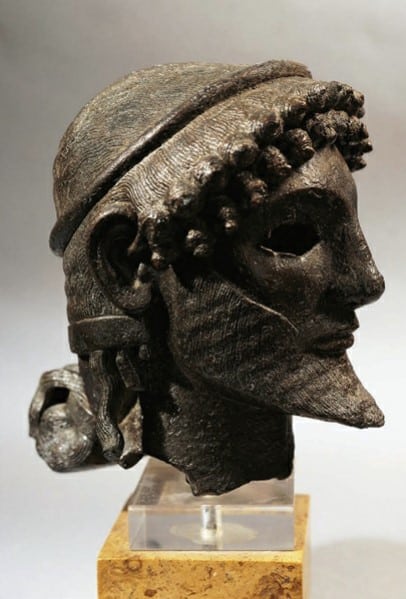
Zeus Wives and Partners
Zeus had 7 wives and numerous partners throughout his lifetime and fathered an astounding total of 92 children by various women he was involved with, most notably Hera, with whom he fathered three offspring – and others, including goddesses and mortal women alike.
Yet despite all these marriages and relationships – which contributed to his mythical status – his reputation remained one of promiscuity and infidelity, which was vital in Greek mythology.
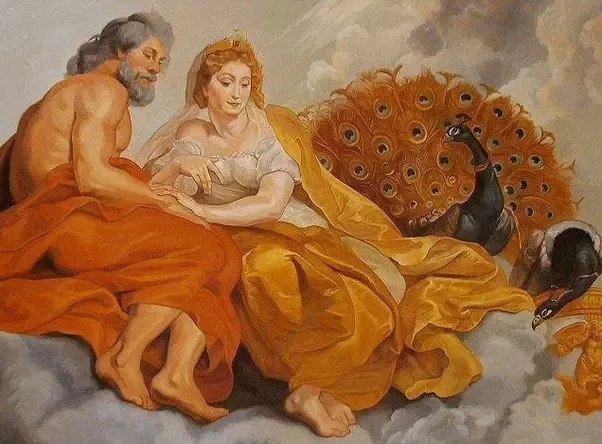
Zeus married and appointed Hera as Queen of the Gods; with Hera as his Queen, he produced three offspring: Ares, Hebe, Hephaestus and Eileithyia. Despite this union, however, he continued having relationships with other women.
He produced additional offspring – Apollo and Artemis with Leto of Titaness fame, Dionysus with Semele of goddess Semele fame, Athena born from his head after swallowing Metis into it, and Persephone from Demeter herself.
Zeus had numerous wives and partners during his lifetime, such as Metis, Themis, Eurynome, Mnemosyne, Leto, Demeter, and Dione Maia Io Europa Semele, among many others. While some relationships were consensual, some involved Zeus adopting animal or bird forms to seduce his partners.
Overall, Zeus was famous for his many wives, partners, and offspring; these relationships remain central to his mythology and continue to draw the interest and study of scholars and enthusiasts alike.
The below table shows the offspring of Zeus and his 7 wives:
| Wife | Offspring |
|---|---|
| Metis | Athena (goddess of wisdom, war, and crafts) |
| Themis | The Horae (goddesses of the seasons and natural order) |
| Eurynome | The Charites (goddesses of charm, beauty, and creativity) |
| Demeter | Persephone (goddess of the underworld and vegetation) |
| Mnemosyne | The Muses (goddesses of arts, sciences, and literature) |
| Leto | Apollo (god of music, prophecy, and healing) |
| Artemis (goddess of the hunt, wild animals, and childbirth) | |
| Hera | Ares (god of war) |
| Hebe (goddess of youth) | |
| Eileithyia (goddess of childbirth) | |
| Hephaestus (god of fire and metalworking) |
Powers and Abilities of Zeus
As king of the gods, Zeus wielded immense power and various abilities. Most notable among these was his control of weather: his most well-known ability was summoning storms, lightning storms, and thunder at will – earning him the infamous name “The Thunderer” Additionally, he could shapeshift, often taking the form of animals or humans when engaging with mortals on Earth.
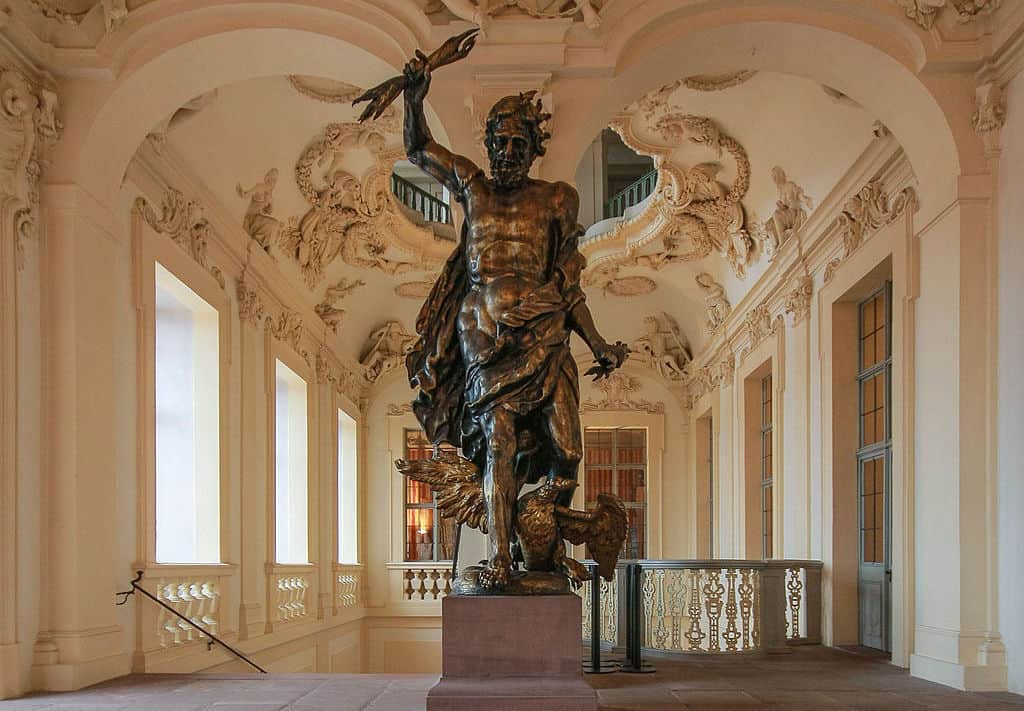
Zeus, the king of the gods in Greek mythology, could transform into animals or other forms to seduce or have sexual relationships with women. He used this power to ravish Hera, Leda, Europa, and many others, resulting in a vast array of divine offspring. This shape-shifting ability was one of Zeus’s defining characteristics and an essential aspect of his mythology.
Zeus was not limited to physical powers alone, as his reputation extended far beyond. As the god of justice, he presided over disputes and ensured the balance was kept throughout the universe. These attributes and his formidable strength cemented his position as ruler of gods and protector of the order.
Stories Concerning Zeus
Greek mythology features numerous stories featuring Zeus, highlighting his power, cunning, and intricate relationships with mortals and gods. Some of the more famous tales include:
Creation of Pandora: Zeus sought revenge against Prometheus after he stole fire from them and gave it to humanity, so he created Pandora as an act of punishment – endowing her with a box or jar containing all the evils in the world, which she unwittingly opened when opening it up.
Zeus became besotted with Phoenician princess Europa and transformed himself into a magnificent white bull to abduct and carry her away to Crete, where their union produced several legendary children.
The Judgment of Paris: When Eris presented Zeus with a golden apple marked “To the Fairest,” he had to choose which goddess — Aphrodite, Hera, or Athena– would receive this honour. To do this properly and avoid conflict with Hera or Athena, he appointed Paris to make this critical choice, ultimately resulting in a war between Aphrodite, Hera, and Athena.
Zeus’ Worship
Zeus was widely revered throughout ancient Greece, with numerous cities dedicating grand temples and sanctuaries. One such site was Olympia Temple which housed his enormous gold and ivory statue – one of the Seven Wonders of Antiquity! This was where the ancient Olympic Games took place every four years to honour Zeus.
Zeus was often depicted holding a thunderbolt to represent his dominion over nature, and sacrifices of animals such as bulls or rams were offered up to win his favour or seek guidance. Festivals and celebrations held in his name, such as Diasia in Athens, also offered sacrifices in hopes of finding protection and assistance from Zeus.
Why did Zeus marry his sister?
Greek mythology often depicted the gods and goddesses as related, with incestuous relationships not uncommon between them.
Zeus was seen as the ruler of all gods and the most powerful, Hera, his sister. Ancient Greeks believed that marrying within their family ensured their bloodline would remain pure.
Zeus and Hera were married as political allies to further his position as King of the Gods. Furthermore, this union represented heaven meeting earth since Zeus represented the sky and Hera represented the earth.
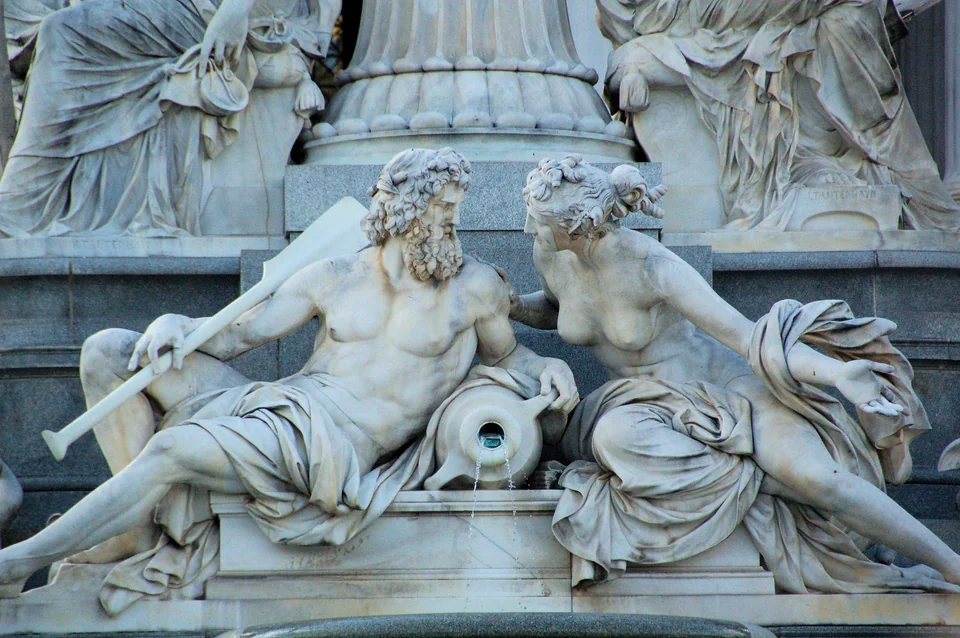
Note that ancient Greeks did not view sibling relationships the same way we do, nor did their understanding of familial bonds in comparison to our modern perspectives.
Zeus’ Legacy
Zeus’ impact goes well beyond Ancient Greece; his stories have inspired literature and music throughout time and present his Roman equivalent of Zeus as its supreme god, ruler of gods in their respective pantheons, further cementing his legacy as ruler of their separate civilizations.
Modern interpretations and depictions of Zeus tend to depict him as a wise, just, and influential figure. Popular culture frequently references Zeus and his stories – from books and movies to video games and comic book characters – further shaping our understanding of this complex deity ensuring his legacy lives on for future generations.
Facts About Zeus
- In Greek mythology, Zeus was the king of the gods and was often depicted as a powerful, bearded man with a thunderbolt in his hand.
- He was the son of Cronus and Rhea and was born on the island of Crete.
- Zeus was known for his romantic escapades and had numerous offspring with mortal women and goddesses.
- He had the power to control thunder and lightning and was often worshipped as a god of the sky and weather.
- Zeus was also the god of justice and was responsible for maintaining order and harmony in the world.
- The Olympic Games held every four years in ancient Greece were held in honour of Zeus.
- Zeus was often associated with the eagle, considered a sacred animal to him.
- His symbols included the thunderbolt, the oak tree, and the eagle.
- In addition to his many romantic escapades, Zeus was known for his battles and conflicts with other gods and mythical creatures.
- Zeus was a central figure in Greek mythology and remained one of the most well-known and fascinating characters in ancient literature.
- Zeus was the youngest of his siblings, responsible for overthrowing his father, Cronus and freeing his brothers and sisters from his stomach.
- He was often depicted as a powerful, wise and just ruler who mortals and gods respected.
- One of his most famous feats was defeating and banishing the Titans to Tartarus.
- Zeus had several sacred sites throughout Greece, including the famous temple at Olympia.
- He was known for his love of justice and was said to punish those who lied or broke oaths.
- In addition to his many lovers, Zeus was also known for his close relationship with his wife, Hera, who was also his sister.
- He was often associated with the oak tree, a sacred symbol.
- The ancient Greeks believed that Zeus lived on Mount Olympus, the highest peak in Greece.
- Zeus was also known for his wisdom and was often sought by other gods and mortals for advice and guidance.
- Many famous stories and legends have been written about Zeus, and his role in Greek mythology remains an enduring and fascinating subject for scholars and enthusiasts alike.
Zeus remains an iconic presence across cultures throughout time and history. His incredible powers, mythological legacies, and captivating tales continue to inspire wonder.
By exploring his worship in ancient Greece and contemporary interpretations of his legacy mythologies, we gain a better appreciation for his role in shaping human history and culture – as we discover more tales about him and his fellow gods, we gain an even deeper insight into this complex realm that makes up Greek mythology; one which will always hold power to fascinate.
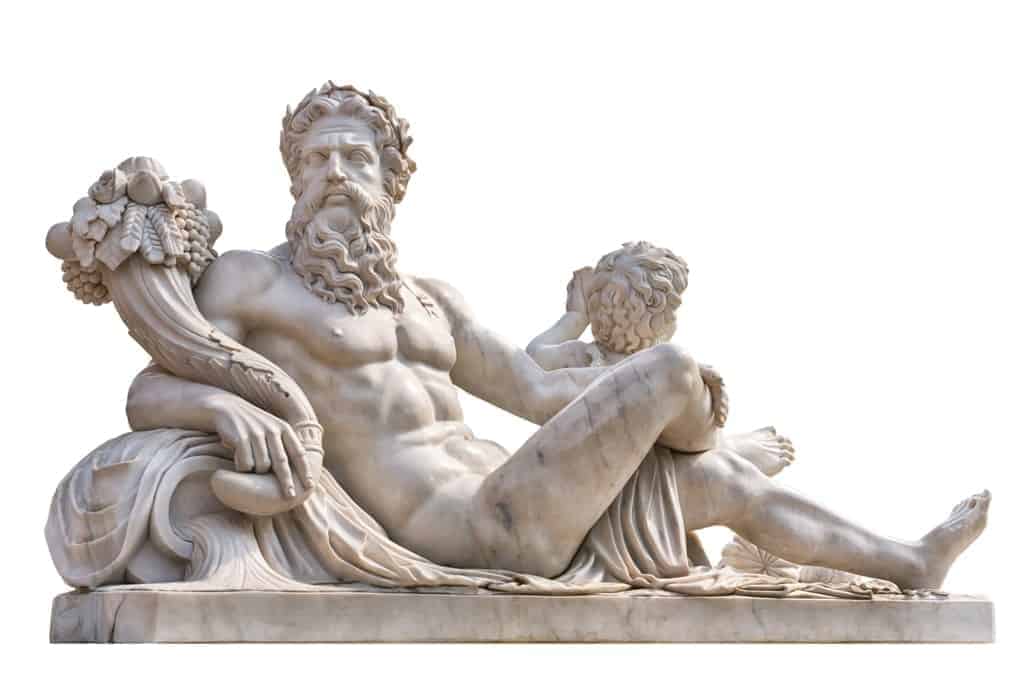
Frequently Asked Questions
How many children did Zeus have?
Zeus had more than 12 children, but the 12 most famous are the Olympians: Athena, Apollo, Artemis, Demeter, Dionysus, Hephaestus, Hera, Hermes, Poseidon, Ares, Aphrodite, and Hestia.
Who is Zeus wife?
In Greek mythology, Zeus' wife is Hera, also his sister. Hera is the queen of the gods and the goddess of marriage, family, and childbirth. Zeus and Hera are one of the essential divine couples in Greek mythology, and their relationship is often turbulent due to Zeus' infidelity.
Who killed Zeus in Greek mythology?
In Greek mythology, Zeus was not killed by anyone. He was the king of the gods and the most powerful, and his rule was never challenged. However, some gods and mortals tried to overthrow him or rebel against him, but none were successful in killing him.

Good – I should certainly pronounce, impressed with your site. I had no trouble navigating through all tabs as well as related information ended up being truly easy to do to access. I recently found what I hoped for before you know it at all. Reasonably unusual. Is likely to appreciate it for those who add forums or anything, website theme . a tones way for your client to communicate. Nice task..
Coming from my examination, shopping for electronic products online can for sure be expensive, however there are some tips and tricks that you can use to obtain the best products. There are always ways to find discount offers that could help make one to have the best electronic devices products at the lowest prices. Great blog post.
Thanks for your write-up. One other thing is that if you are disposing your property yourself, one of the problems you need to be alert to upfront is just how to deal with home inspection reports. As a FSBO owner, the key to successfully moving your property as well as saving money about real estate agent income is understanding. The more you realize, the better your sales effort is going to be. One area when this is particularly significant is reports.